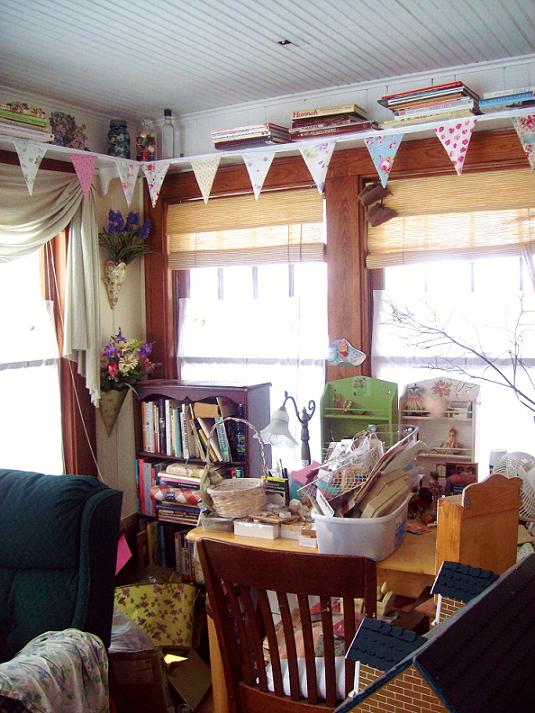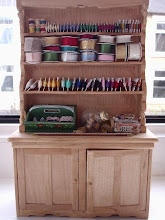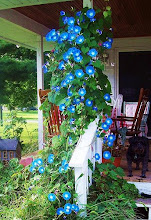
I was poking around in my 43 Things list this morning and came across a write up I made on keeping chickens so thought I would share it here:
Raising Backyard Chickens
How I did it: First I read up on backyard chickens care/feeding/raising and then joined backyardchickens.com

When we relocated to Northern Illinois, we bought a house with a red barn/garden shed that had electricity wired in and a hatch flap that would allow them to get outside. We dug post holes and cemented in some 4x4x8 posts and stapled wire penning to them. We put shavings on the floor using the deep litter method, a nesting box, and some hay bales to make them little igloo garages for cold weather.
We put a roof over the pen because they loooove to fly over the wall and peck in the garden or examine the neighbor's shrubbery. They can definitely fly and I've seen ours get up to 7-8 feet off the ground.
Regular or organic feed is $10-20 for a big bag and they get fresh water every day. For them, I planted seed packets of mustard greens, kale, leaf lettuce; lots of extra rows of green in the garden last summer and just picked it and threw it into their pen. Very happy chickens and we got the nutrition value back in their eggs.

We started with 4 three month old pullets in October 2007. You can order chicks from Murray McMurray but I didn't want the added expense and equipment of hatching eggs or raising tiny chicks without a mother hen. I joined the forum on backyard chickens and looked for someone local who was parting with a small flock that had grown up together. Once we got them home initially, I just added a regular metal clip utility light overhead on a timer so they get 12 hrs of light per day (or else they don't lay eggs).

Recently, last August 2008 we received an email from the farmer saying he had new flocks. I wanted one or two new chicks but brought hubby and little one so we ended up with 4 more two week old chicks and they are just now 4 months and starting to lay. They have chick feed from birth to 3 months and then layer feed until they stop laying. Our remaining Buff Orpington is very broody and sits on her nest of laid eggs most of the time so we thought we'd give her some little girls to love. Didn't work out that way, she was aggressve towards them. So best laid plans and all that. However, the advantage to little chicks is that you can handle them excessively and make them tame to humans.
I was a bit worried about the little ones when cold weather set in but they are doing just fine. At 3-4 months old they are not so little any more, they are full grown now. In sub-zero weather we turn on two overhead heat lamps so they can warm up. On the coldest of cold below zero days I make them scrambled eggs. Without a rooster to fertilize them, their eggs are simply full of vitamins and a hot breakfast warms up their bellies.
The Auracana is currently the only little one laying but she produces the most beautiful tiny green eggs.

We lost one of the original Orpingtons to a respiratory wheeze and one of the new baby chicks went stir crazy when the snow arrived and forced her way outside in a snowstorm (poor thing-through the latched side flap).
These are pets and we don't intend to eat them. Hens lay eggs for about 1-2 years or more but they live for about 10 years.
We have 3 black sex links, 1 Buff Orpington, 1 Auracauna - sometimes called the Easter Egger or EE (lays blue/green eggs!), and one Rhode Island Red
Lessons/tips:
Let them acclimate to cold weather, don't use the heat lamps too much. They don't like to be too warm and if you have a power outtage then you'll quickly have hensicles.
Alternately, they will cool off in the summer by flapping in the pine shavings or you can give them a wading pool of sand to "splash" in.
Compost the shavings for a great garden fertilizer. Once per year shovel out all of their shavings and replace it with new. Pine shavings preferably, not cedar as it can be damaging to them.

These eggs are more nutritional and have half of the cholesterol of store bought eggs. Backyard eggs have approximately twenty-five percent more vitamin E, seventy-five percent more beta carotene, and as much as twenty times the amount of Omega-3 fatty acids as do factory farmed eggs. Even the yolks are a super bright yellow. Store eggs can be 2 months old or worse.
Be careful of your zoning, most suburban areas do not allow roosters. Get sexed chicks or 3 month old pullets so you know that you are getting females. If you want to hatch your own eggs then have a plan for getting rid of the roos. We live in a rural area zoned agricultural but we still have lots of neighbors and the roo noise would have been pretty annoying.
The hardest thing about them is the infighting to determine the pecking order. Our littlest hen gets her butt pecked so much by the others that she has a permanently bare red posterior. And chickens are compelled to peck the color red so it's a vicious circle. Hubby calls her Red Butt. They can be brutal to each other; scratches, cuts, bullying, fighting. Just keep an eye on them but don't interfere too much. If you are introducing new birds to an established flock, please do some research because it's a difficult thing to do.
The best thing about them is I never again have to waste any sort of vegetable, fruit, or piece of bread. They are my little clucky garbage disposals. Great if we don't eat the bananas soon enough or if the lettuce goes a bit yellow in the vegetable bin.
I do resist showing them at fairs or picking up new cuties from the local poultry show because you just don't know if they're going to pick up a nasty virus or bacteria and bring it home. Plus the whole re-introduction to the flock for the one who got out for a field trip is something else to be avoided.

"Don't use fresh eggs for baking, use last week's or the week before." I don't know why but my elderly neighbor used to farm chickens and that's what she told me and I do what I'm told when it comes to people with more wisdom.
Recommended Reading: Still Life With Chickens (Starting Over In A House By The Sea) by Catherine Goldhammer
Non-fiction 2006: Catherine, freshly divorced and with a young daughter, decided to have a simpler life and built a pen and got a flock of backyard chickens. Her trials and tribulations with them. This is the book that stopped me just thinking about doing it and going out and making it happen.

http://backyardchickens.com
http://murraymcmurray.com
http://MyPetChicken.com





































































